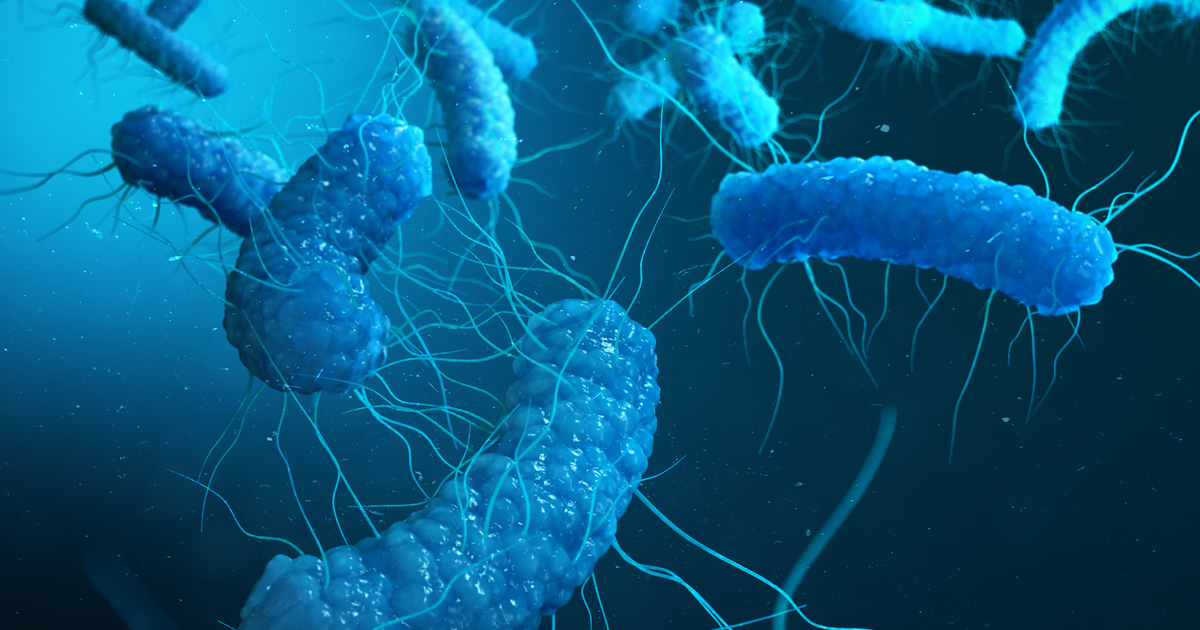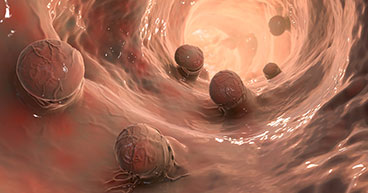
The human colon is a teeming sea of living organisms. In this briny deep within the gut swim trillions of bacteria from hundreds of different species. Some species of bacteria, if left unchecked, could cause infections or disease. Others promote good digestion and help fight infection.
“The normal bacterial balance is when there are significantly more good bacteria to overpower the bad bacteria,” says Pankaj Vashi, MD, AFAG, FASPEN, a gastroenterologist at City of Hope® Cancer Center Chicago.
Doctors and scientists have discovered the benefits of maintaining a healthy balance of good and bad bacteria in the colon and the role our gut bacteria, also called microbiota, microbiome or gut flora, plays in many diseases, including cancer.
New research suggests that poor gut bacteria may be playing a significant role in the increase in colorectal cancer in young adults. New cases of the disease in Americans under 50 years old have steadily risen over the last 20 years. And while obesity, poor diet and alcohol consumption are thought to be the source of the increase, they also contribute to an imbalance in gut bacteria.
“This is very fascinating research, but still preliminary,” Dr. Vashi says. “However, the different bacteria found in patients with colon cancer before the age of 50 has to be directly related to the diet. It goes back to lifestyle changes that have occurred over the last four decades with increased intake of processed foods, sedentary lifestyle and introduction of fast foods.
More research, including studies of how the introduction of probiotics with specific bacteria may alter the gut flora, are underway and it will be interesting to see if that could reverse the incidence of colon cancers in young adults.”
In this article we’ll explore:
- What is the human microbiome?
- Gut bacteria and cancer
- The microbiome and cancer in young adults
- Gut bacteria in cancer patients
- How to improve the gut microbiome
If you’ve been diagnosed with colorectal cancer and are interested in getting a second opinion on your diagnosis or treatment options, call us or chat online with a member of our team.
What is the human microbiome?
In 2008, the National Institutes of Health established The Human Microbiome Project to research and compile data to study the microbiome’s impact on disease. Here’s some of what we know so far:
- Human microbiota is made of trillions of viruses, fungi and other microorganisms.
- The human microbiota has 10 times more microorganisms than human cells.
- Microorganisms make up about 3 percent of our total body mass, or about six pounds of a 200-pound adult.
- Imbalances in human gut flora have been linked to autoimmune diseases such as Crohn’s disease and multiple sclerosis, obesity and heart disease.
“It has been found that bacteria play a role in multiple diseases,” Dr. Vashi says. “There are studies now that are showing that changes in bacterial flora can contribute to developing conditions, such as irritable bowel syndrome and colitis. Fascinating work has been done where we are learning more about gut microbiome playing a major role in many conditions, including obesity.”
Gut bacteria and cancer
The role gut bacteria play in cancer risk is not fully understood. However, it is known that gut bacteria imbalances sometimes causes health problems that may raise the risk of cancer.
For instance, a diet high in meats and processed foods and lacking in fresh vegetables may damage gut flora and increase the risk of certain gastrointestinal cancers, including colorectal cancer.
Also, an imbalance in the microbiome may lead to obesity, which is a risk factor for many cancers, including breast cancer and prostate cancer.
“We know the microbiome can play a major role in developing obesity,” Dr. Vashi says. “And we know that obesity plays a role as a risk factor in certain cancer types. So, there is a strong argument that people who have bad microbiomes are likely to become more obese, which may make them more susceptible to developing more cancer types.”
Research has shown connections between gut flora and cancer risk factors and the effectiveness of treatments.
Multiple studies have found that the composition of a patient’s gut bacteria may influence the performance of drugs called immune checkpoint inhibitors. In one of those studies, melanoma patients who had good bacteria in their guts had better responses to anti-PD-1 immunotherapy drugs than patients with bad gut bacteria.
“An important and clinically relevant issue is whether manipulation of the intestinal microbiome could turn patients [who] are nonresponsive to immune checkpoint blockade into responders,” Christian Jobin, PhD, of the University of Florida, writes in an editorial quoted by the National Cancer Institute’s Cancer Currents blog.
The microbiome and cancer in young adults
Age is still the greatest risk factor for colorectal cancer. The average age of a patient at diagnosis is 66 years old. But 20 years ago, it was 72.
From 1995 to 2019, new cases of colorectal cancer nearly doubled in Americans younger than 55. Colorectal cancer is now the leading cause of cancer deaths for Americans 20 to 49 years old, according to the National Cancer Institute.
Genetics also play a role in colorectal cancer risk, but research suggests that is not usually the case in young adults.
As researchers learn more about the role gut flora plays in cancer risk, they have discovered a possible link between gut bacteria and colorectal cancer in young people.
Researchers in China have found specific bacteria to be more common in some cancer patients. And another study published in The Lancet says that bacteria found in colorectal tumors in early onset patients are different from those found in older patients.
Gut bacteria in cancer patients
Maintaining good gut bacterial balance in cancer patients is often a challenge, potentially impacting treatments and leading to difficult side effects. That’s why, experts say, it’s important for cancer patients to be aware of the dangers, and for clinicians to give them tools to help prevent and manage them.
Cancer may wreak havoc on the human microbiota. The disease strains the immune system, which may allow bad bacteria in the gut to flourish. Antibiotics used to fight infection also may kill good bacteria in the colon. Antibiotics are like a grenade that can destroy many bacteria in your gut, both good and bad.
To further complicate matters, cancer treatments may lead to a pronounced imbalance of microorganisms, a condition called dysbiosis. For instance, the treatments listed below may all have an impact on gut bacteria.
Surgery: Removing part of the colon also removes bacteria and some of the tissue in which they live.
Radiation therapy: This treatment may damage or inflame tissue in the colon.
Chemotherapy: Drugs used to treat cancer may wreak havoc on the gut microbiome. Treatments may kill bacteria that aids digestion, often leading to diarrhea, which further depletes good bacteria.
“Whenever patients get sick from chemotherapy and get diarrhea, they lose a lot of good bacteria,” Dr. Vashi says. “And we have patients who take multiple antibiotics that destroy a lot of good bacteria. These can lead to different infections, including the most notorious one, which is C. difficile.”
What is clostridium difficile?
Clostridium difficile infection, known simply as C. diff, is marked by inflammation in the colon, often brought on by disrupted gut flora and a compromised immune system. C. diff infections are diagnosed in about 10 percent of cancer patients.
Research indicates cancer patients with C. diff may have poorer outcomes than those who don’t have the infection. To treat patients with C. diff, Dr. Vashi may consider a fecal transplant procedure, in which feces from a healthy donor is implanted into the colon of the infected patient.
“We see some dramatic responses in which the diarrhea is gone in as little as 24 hours,” Dr. Vashi says. “Many times, they don’t get recurrent infections.”
To help reduce the effects of chemotherapy on the microbiome, doctors and nutritionists often turn to prebiotics to bolster the microbiota and probiotics to restore good bacteria lost or destroyed by treatment. During and after therapy, probiotic supplements that contain multiple types of microorganisms help restore the good bacteria in the gut.
How to improve the gut microbiome
At-home microbiome tests are available, but they are of questionable benefit. The tests may be able to measure your microbiome, but then what? There are no standards yet for what a normal microbiome should be.
And they are not cheap. Microbiome tests pitched on the internet range from $50 to $300.
The best way to develop healthy gut flora is with some of the lifestyle choices outlined below designed to keep your belly bacteria balanced.
Expand your menu. Gut flora is made up of a diverse collection of bacteria. A diverse menu of foods encourages the growth of many types of bacteria, which makes for a healthy microbiota.
Try fermented foods. These foods contain and feed probiotics and help promote healthy gut bacteria. Fermented foods include yogurt, kimchi, sauerkraut, miso and tempeh.
Eat more fruits, vegetables and beans. Limiting animal fats and eating a plant-based diet will increase fiber intake and promote a healthy gut.
Stick with whole grains. Processing often strips fiber and nutrients from many grains, such as wheat and rice. Whole grains are rich in fiber and good for the gut.
Avoid artificial sweeteners. Research indicates that sugar substitutes, such as saccharin and aspartame, may promote obesity rather than prevent it, and damage gut flora.
Talk to your doctor. Ask questions about antibiotics you may be prescribed and talk to your doctor about the benefits of a probiotic supplement.
Learn about prebiotics. Probiotics have long been promoted to improve gut health, but prebiotics also are important. Examples of prebiotics include leeks, onions, garlic, asparagus, spinach, bananas, oats and beans.
Consider your lifestyle. Quit smoking. If you drink alcohol, do so only in moderation. Get enough restful sleep. Get enough exercise. Eat a balanced diet. A healthy life often means a healthy gut, and a healthy gut helps promote a healthy life.
If you’ve been diagnosed with colorectal cancer and are interested in getting a second opinion on your diagnosis or treatment options, call us or chat online with a member of our team.


